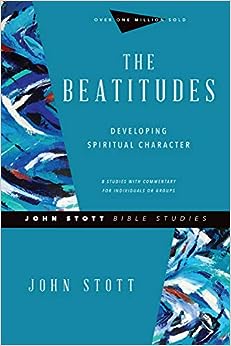This week we are discussing the fourth Beatitude: “Blessed are those who hunger and thirst for righteousness, for they will be filled.” For Tuesday, please work through the questions posed by John Stott in The Beatitudes – Developing Spiritual Character. As we begin going through the Beatitudes, pay attention to how they build upon each other: poor in spirit – mourn – meek – hunger for righteousness leading to the kingdom of God – comforted – inheritors – satisfied.
As we begin looking at this Beatitude, the word used for “righteousness” (dikaiousyne) also means “justice.” These twin meanings of “righteousness and justice” form the very foundation of the Biblical narrative. Abraham was chosen by God so that “he may charge his children and his household after him to keep the way of the Lord by doing righteousness and justice.” Gen 18:18-19. “Because the Lord loved Israel forever, he has made [Solomon] king, so that he may execute righteousness and justice” 1 King 10:9. For the prophets, it was by this standard that God judged his people. “For I will make justice the line, and righteousness the plummet.” Isaiah 28:17. Or as Amos says: “Let justice roll like a river and righteousness like an everlasting stream.” Amos 5:24. Therefore, we are called to deeply desire this foundational commandment of God.
What does it mean, however, to be righteous? I have attached Kenneth Bailey’s commentary on this Beatitude from Jesus Through Middle Eastern Eyes (pp.76-81) and Abraham Heschel’s discussion of these terms in The Prophets (pp.249-81). Throughout the Scriptures, righteousness is not “an ideal ethical norm” (Bailey, p.77) or obedience to a set of impersonal laws (Heschel, p.268). Rather, these words are grounded in interpersonal relationships and the rights and duties we owe to one another and to God. (Bailey, p.77; Heschel, p.268). Throughout Scripture, these duties arise not simply in the negative of doing no harm, but include the affirmative duties to “show mercy and compassion on the outcast, the oppressed, the weak, the orphan, and the widow” (Bailey, p.79) and “to have a burning compassion for the oppressed.” (Heschel, p.256). Righteousness and Justice don’t rise from obedience to a list of rules, but from seeing the Divine in everyone and treating them accordingly. Matt 25:31-46. If you have time this weekend, please read through Bailey and Heschel to gain a deeper understanding of that for which we are to hunger and thirst.
Dinner is at 6. The menu is halupki (Slovak stuffed cabbage). Discussion about 6:45. Hope to see you here, and please bring a friend.
For the LORD is righteous;
Psalm 11:8
he delights in righteous deeds;*
and the just shall see his face

